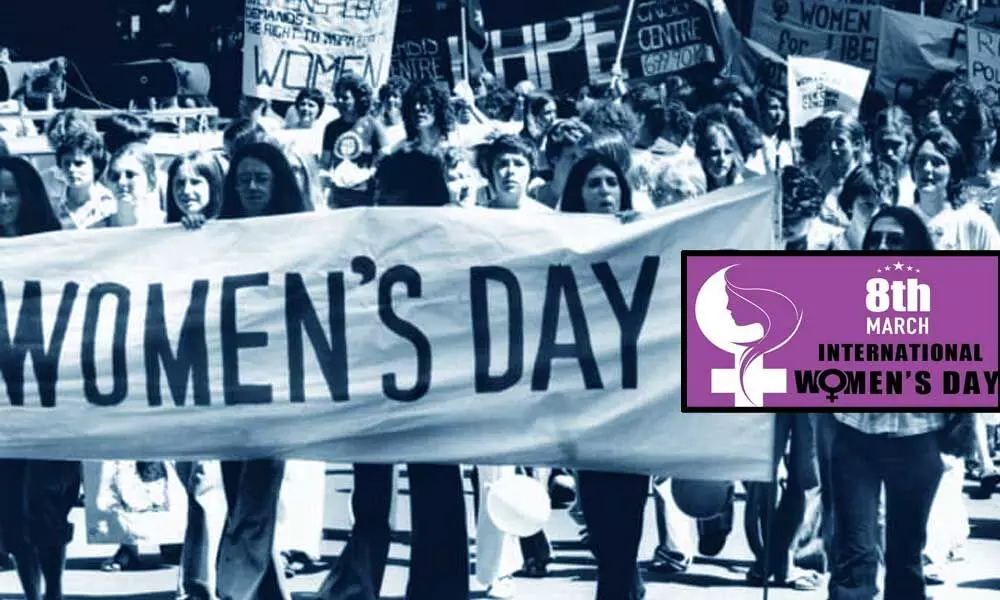International Women's Day 2020: History, Is women's day a protest or a celebration? What is it celebrated for? When is it?
 International Women’s Day 2020
International Women’s Day 2020International Women's Day is a worldwide event honouring the contributions of women– from the political to the social – while seeking gender equality.
International Women's Day is a worldwide event honouring the contributions of women– from the political to the social – while seeking gender equality.
Since the early 1900s, it has been observed and is now celebrated on March 8 (this Sunday) every year. It does not belong to any party but brings together governments, women's organizations, businesses, and charities. The day is packed with exhibitions of the arts, seminars, rallies, networking events, conferences, and marches around the world.
But how did the celebratory day begin – and when are women uniting against this year? Here is everything you need to know.
How did it get underway?
It is hard to tell exactly when International Women's Day (IWD) (as it is known) began. Its origins can be traced back to 1908 when 15,000 women marched through New York City demanding voting rights, better pay and shorter work hours.
A year later, in line with a resolution by the Socialist Party of America, the first National Woman's Day was celebrated in the US on February 28.
In 1910, a woman named Clara Zetkin-the head of the Social Democratic Party's' women's office' in Germany-put forward the idea of an International Women's Day. She proposed that each country should honour women each year on a single day to advocate for their demands.
A conference of more than 100 women from 17 countries agreed to her suggestion and IWD was formed. In 1911, it was celebrated for the first time in Austria, Denmark, Germany and Switzerland on March 19.
The decision to move IWD to March 8 was taken in 1913, and it has since been celebrated on that day. The day was only recognised in 1975 by the United Nations but since it established a theme for the celebration each year.
Former US President Barack Obama proclaimed March as' Women's History Month' in 2011.
Why are we even doing this for?
Basically because the original goal –to achieve the world's women's full gender equality– has not yet been achieved. A gender pay gap persists around the globe and women in business or politics are still not present in equal numbers. Figures show that women's education, health and violence towards women is even worse worldwide than men's.
The gender gap will not close by until 2186, according to the World Economic Forum. Through IWD, women around the world are coming together to push the world to accept these disparities– while recognizing the accomplishments of women breaking these barriers.
According to a 2017 report by the World Economic Forum, it could still take another 100 years before the global equality gap between men and women disappears entirely.
Females essentially worked "free" from November 14 to the end of the year in 2019 due to the gender pay gap. According to new gender pay gap figures, females are also paying less than half as men at some of Britain's major companies.
Women's rights have dominated the news for the last couple of years, amid a worldwide scandal of sexual misconduct rippling through industries. Amid the outpouring of complaints against Harvey Weinstein and other leading men in power (and the landmark trial of Weinstein), the # MeToo movement gave women a voice about the abuse and harassment they suffer in film, fashion, music, politics and art.
There was a vocal, headline-grabbing fight for women's rights in 2018, with female actresses donating money and wearing black at awards ceremonies in support of #TimesUp and BBC journalist Carrie Gracie publicly resigning as China editor over unequal pay.
The search began last year, with members of the US Democratic Party wearing white at Donald Trump's State of the Nation address. Plus, others wore red robes to mimic The Handmaid's Tale's dress, to condemn the state of Alabama putting in the US's strictest laws on abortion.
Notwithstanding gender equality still apparently 167
away, many are hoping the trajectory surrounding women's rights climbs as the year continues.
What's the theme for this year?
The theme for IWD 2020 is # EachforEqual, which highlights all the steps that we as individuals can take to fight sexism, combat discrimination, and celebrate the contributions of women.
2020 is a significant year for equality between the sexes. It is the Beijing Declaration and Forum for Action's 25th anniversary, the most developed blueprint for achieving gender equality across the globe. It also marks 10 years since UN Women was founded, and marks the 20th anniversary of UN Security Council Resolution 1325 on women, peace and security.
Last year, the theme was #BalanceForBetter, which aimed to encourage gender balance in boardrooms, in the media and in wealth as a way for economies to thrive. It echoed the aims of the Telegraph's Women Mean Business campaign - which launched on IWD 2018 to help close the funding gap for female entrepreneurs in Britain.
As a result of our campaign, banks will now be compelled to publish regular updates on how much they invest in businesses run by women as part of a series of new measures to help female entrepreneurs. Read more about the Telegraph's victory here, or watch the video below in which our Women's Editor and Associate Features Editor Claire Cohen explains all about the campaign and why we started it.















